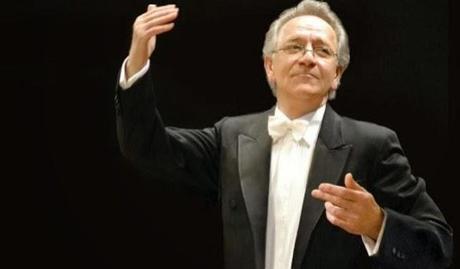by Paul J. Pelkonen

Yuri Temirkanov. Image © Medici.TV.
The Russian city of St. Petersburg is invariably associated with Mariinsky Orchestra and its mercurial leader Valery Gergiev. However, the St. Petersburg Philharmonic Orchestra is an even older organization (founded in 1882) with its own rich history and distinctive Russian sound. Last Thursday night, this splendid ensemble returned to Carnegie Hall for the first of two concerts under the baton of music director Yuri Temirkanov.The evening opened with three orchestral excerpts from Nikolai Rimsky-Korsakov's The Legend of the Invisible City of Kitezh and the Maiden Fevronaya, a mystic opera whose title may be the longest in the 500-year history of that art form. Mr. Temirkanov wasted no time in demonstrating the good qualities of his players, as robust string sound and unusually sweet horn playing were used to re-create stirring moments from this unique and under-performed score.
The three pieces chosen (in orchestral arrangements by Maximillian Steinberg) barely scratched the surface of Kitezh. The "Invasion of the Tartars" and "Battle of Kerjenetz" showcased Rimsky's gift for orchestral color and pageantry but ignored the spiritual message at the core of this opera. Far better was the excerpt: the evocative opening to the first act. A lilting, almost folk-like melody arises from a mist of strings and fluttering winds. As the main theme wended its way forward, there was a sudden feeling of deep, settling peace and anticipation for when this mighty score gets another complete performance in New York.
The opera excerpts were followed by much stronger medicine. ...al Niente is a huge (30-minute) tone poem by the Georgian composer Giya Kancheli. Written for and dedicated to Mr. Temirkanov, the work follows this composer's usual practice of creating mood and tension through carefully controlled, modulated drones that build slowly, almost imperceptibly in volume. The effect on the listener is like wandering through a maze of twisty passages, only to have huge slab-like tone clusters bar the the way and force a change in direction.
Under Mr. Temirkanov, the St. Petersburg players dispatched this piece with a high level of professionalism. Using both acoustic and electric instruments (a bass guitar is part of the orchestration) the orchestra drew the listener into Kancheli's labyrinthine sound-world. The stentorian blasts of sound were played with the exact, precise timing of hammer-blows. The work ended with an exquisite fade-out that owed something to late Mahler, balm for the ears after the fortissimo thunder of the tone clusters.
The Carnegie Hall audience found itself back on more familiar ground with Tchaikovsky's First Piano Concerto, a beloved concert favorite and a training ground for young virtuosos as they embark on international touring careers. At this concert, listeners were introduced to Denis Kozukhin, who combined technical ease with a passionate, driving performance that understood the difficult ups and downs of this unconventional concerto.
Despite its familiarity and omnipresence in the repertory, the "Tchaik One" is a strange work, so much so that it was rejected by the famed pianist-composer Nikolai Rubinstein in 1874. The big melody from the opening bars (based on a Ukrainian folk song) is never repeated in the first movement, (the main subject is drawn from another folk melody) nor in the rest of the concerto. The pianist is not just soloing--they must declaim a wordless monologue, answered by the almost chorus-like response from the assembled orchestra.
Mr. Kozukhin met the challenges of the huge early movement head-on, ably supported by Mr. Temirkanov's expert accompaniment and the lush string carpet rolled out by the St. Petersburg players. The young pianist bent forward in concentration, storming the battlements of the final movement and giving the listeners an energetic, if slightly safe ride over this familiar musical terrain. And like any budding virtuoso, he was wise enough to play an encore: a beautifully drawn performance of the Melodie from Gluck's Orphée et Eurydice in an arrangement by Giovanni Sgambati.

